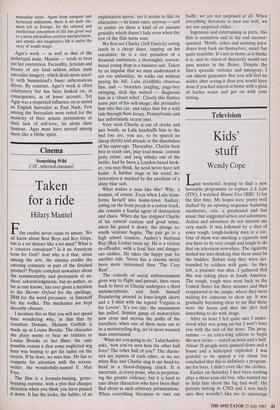Cinema
Something Wild (`18', selected cinemas)
Taken for a ride
Hilary Mantel
Film credits never cease to amaze. We all know about Best Boys and Key Grips, but is a set dresser like a set meal? What is a 'creative consultant'? Is it an American term for God? And why is it that, alone among the arts, the cinema credits the catering company as part of the finished product? People complain nowadays about the sentimentality and pretension of au- thors' acknowledgments, but no author, so far as one knows, has ever given a mention to the Shorter Oxford for the spellings, IBM for the word processor, or Smirnoff for the vodka. The mechanics are kept decently obscure.
I mention this so that you will not spend time wondering why, in this film by Jonathan Demme, Melanie Griffith is made up as Louise Brooks. The character she plays seems to bear no relation to Louise Brooks or her films; the only possible reason is that some neglected wig man was hoping to get his name on the screen. If he does, we miss him. He has to compete for attention with the screen- writer, the wonderfully-named E. Max Frye.
The film is a formula-busting, genre- hopping exercise, with a plot that changes direction when you think you have pinned it down. It has the looks, the habits, of an exploitation movie, yet it seems to like its characters — its lesser ones, anyway — and to confer on them a kind of en passant geniality which doesn't fade even when the rest of the film turns sour.
We first see Charlie (Jeff Daniels) eating lunch in a cheap diner, tapping on his calculator; he is a vice president of a financial institution, a thoroughly conven- tional young chap in a business suit. Taken by an impulse that we must understand is not too unfamiliar, he walks out without paying his bill. Lulu (Griffith) observes this, and — bracelets jangling, page-boy swinging, slick lips wetted — diagnoses him as a 'closet rebel'. Clearly this flatters some part of his self-image; she persuades him into her car, and takes him for a wild ride through New Jersey, Pennsylvania and her unfortunate recent past.
Very soon Charlie is out of stocks and into bonds, as Lulu handcuffs him to the bed (we are, you see, to be spared no cheap thrills) and attends to the dissolution of his super-ego. Thereafter, Charlie feels free to crash cars, play loud music, commit petty crime, and swig whisky out of the bottle; had he been a London-based brok- er, you may think, he need never have left home. A further stage in his social de- terioration is marked by the purchase of a shiny blue suit.
What makes a man like this? Why, a woman, of course. Even when Lulu trans- forms herself into home-town Audrey, sitting on the front porch in a cotton frock, she remains a fearful agent of destruction and chaos. When she has stripped Charlie of his natural caution and good sense, when his guard is down, the plunge to- wards violence begins. The pair go to a high school reunion; Audrey's husband Ray (Ray Liotta) turns up. He is a violent ex-offender, with a feral face and danger- ous clothes. He takes the happy pair for another ride. Never has a cinema motel been more misnamed than 'The Cosy Rest'.
The comedy of social embarrassment gives way to flight and pursuit, then veers back to farce as Charlie undergoes a third metamorphosis, and finds himself floundering around in knee-length shorts and a T-shirt with the legend 'Virginia is for Lovers'. It's too late; the amusement has palled. Sinister gangs of motorcylists now cross and recross the paths of the travellers; when one of them turns out to be a motorcycling dog, we're more wearied than entertained.
`What are you going to do,' Lulu/Audrey asks, 'now you've seen how the other half lives? The other half of you?' The charac- ters are aspects of each other, as we see when Ray and Charlie slug it out head-to- head in a blood-dripping clinch. It is uncertain, at every point, who is perpetrat- ing the greater violence; but it is hard to care about characters who have been shuf- fled about in such arbitrary permutations. When everything threatens to turn out badly, we are not surprised at all. When everything threatens to turn out well, we are not surprised either.
Ingenious and entertaining in parts, this film is centreless and in the end inconse- quential. Motifs, jokes and seeming para- doxes loop back on themselves, smart but quite resistible. It's not as funny as it thinks it is, and its vision of depravity would not pass muster in the Beano. Despite the film's sporadic violence and misogyny, I can almost guarantee that you will feel no wilder after seeing it than you would have done if you had stayed at home with a glass of barley water and got on with your tatting.


















































 Previous page
Previous page